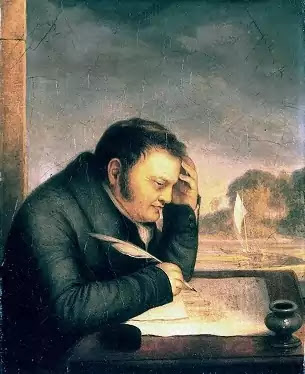Also Read
The eighteenth century was the period of reason and commonsense. The spirit invaded the criticisms and reviews of the period. The criticisms in the Spectator and the Toiler by Addison and Steele and Dr. Johnson's reflections in The Rambler were inspired by a rational thought and attitude. The eighteenth century Shakespearean criticisms were critical of the exuberance and irregularities in the characterisation and construction of Shakespeare's plays. They were in favour of the observance of the rules and unities enjoined on by Aristotle and other masters. The romantic criticisms were a reaction against the doctrine of the age of reason.
The great development of prose writing in the Romantic period showed itself chiefly in the literary criticism and in the essay and it attained its most striking effects. Romantic spirit invaded the reviews and criticisms of the period. All criticisms at this time was however not romantic. On the contrary, the great reviews founded at the beginning of the century, The Edinburgh Review, a Whig organ started in 1802, and The Quarterly Review which arose in opposition to it in 1809 as a Tory organ agreed in denouncing the new poetry. The spirit of the eighteenth century still dominated their literary criticism. Francis Jeffrey (1773-1850), though he gave high praise to Childe Harold and the Waverley Novels led a lively attack upon the lake poets, especially Wordsworth, and it was his review, The Edinburgh that ridiculed Byron's first poem. Gifford in the Quarterly made a harsh and cruel review of Keats Endymion.J. G. Lockhart made violent assaults on the Romantics in the earlier numbers of Blackuwood's Magazine.
However, the new tendencies in poetry and art were ably defended by the romantic poets themselves and they set the tone of romantic criticisms and reviews. Wordsworth set forth the ideas of romantic reaction against eighteenth century poetry of commonsense and inane phraseology in the Prefaces to the Lyriut Balads (1798, 1800, 1802 three editions) and indicated the aims and beauties of their poetic experiments. He proclaims the lofty conception of the dignity of poetry which is "the breath and finer spirit of all knowledge" and which is the product of "the spontaneous overflow of personal feelings," taking its origin from "emotion recollected in tranquillity". He also declared that poetry would deal with incidents and situations from common life. Over these incidents, he proposes to throw a certain colouring of the imagination whereby ordinary things should be presented to the mind in an unusual aspect". Discarding the gaudiness and inane phraseology of many modem Writers he insists on "a selection of the real language of men in a state of vivid sensation."
In the new criticism it was Coleridge who took the lead. He was much influenced by Lessing, Schlegel and J. P. Richter who made a reaction against the doctrines of the classical age and specially against the French theatre, finding their ideal in Shakespearean drama. Coleridge in his criticisms revealed the hidden beauties of Shakespearean drama. It was believed by the eighteenth century critics that Shakespeare had genius but he showed that Shakespeare possessed supreme art, art no longer mechanical but organic like a work of Nature. He fused different elements-tragedy and comedy, realism and idealism into a harmonious whole, instead of keeping them separate. Coleridge's Lectures on Shakespeare inaugurated the romantic criticism of Shakespeare. His main focus is on Shakespeare's characters. He analyses the characters as if they are real human beings. In his Biographia Literaria (1817) he set forth the ideas of romantic imagination and showed his wonderful analytical faculty in discussing the merits and defects of Wordsworth's poetry.
Charles Lamb possessed an easier and more attractive way of writing. In his Specimens of the English Dramatic Poets Contemporary with Shakespeare (1808), he selected the finest scenes from the unequal plays of the Renaissance theatre, and brought out their merits by means of commentaries that were remarkable for their justice and for their warmth of sympathy. He wrote about the prose writers of the age of Milton, the comic authors of the Restoration and about those who were neglected for a century. Lamb wrote his essay on the tragedies of Shakespeare considered with reference to their fitness for stage representation. It makes a passionate and romantic plea for the liberty of the imagination and its emancipation from the tyranny of the stage. Lamb's prose is imaginative and highly individual.
William Hazlitt was also a literary critic. Romantic criticism of Shakespeare started with Hazlitt's Characters of Shakespeare's Plays. Lectures on the English Poets, Lectures on the English Comic writers are Hazlitt's other critical works. In The Spirit of the Age, he reviewed the writers of his own age. Hazlitt's prose is lucid and vigorous but less charming than that of Charles Lamb.
